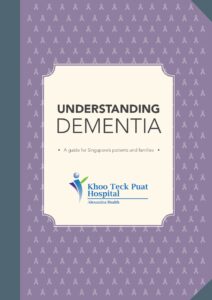Playback speed:
Alzheimer’s Disease (AD)
Vascular Dementia
Vascular dementia is a type of dementia that is caused by a disease or injury to blood vessels in the brain, mostly in the form of strokes. The onset of this kind of dementia may be abrupt, and symptoms depend on the location and impact of the stroke. A person with vascular dementia may also show evidence of silent strokes on brain scans. While vascular dementia is not reversible, it is important to treat its risk factors. Controlling risk factors such as high blood pressure, diabetes mellitus, high cholesterol, and smoking may slow the disease’s progression and reduce stroke recurrence.
Lewy Body Dementia (LBD)
Lewy body dementia is a type of dementia that occurs when there is an abnormal build-up of structures called Lewy bodies inside brain cells. This causes changes in movement, thinking and behaviour. Movement symptoms of LBD are similar to the symptoms of Parkinson’s disease – these include slowness, tremors, and rigid muscles. Other prominent symptoms include problems with attention, planning and organising activities, and vivid visual hallucinations. People with LBD have higher risks for falls in view of their increased rigidity, instability and slow gait.1
Frontotemporal Dementia (FTD)
Frontotemporal dementia is a type of dementia that is characterised by marked personality changes and in some cases, language difficulties. It is caused by progressive damage to the frontal and/or temporal regions of the brain. FTD can lead to reduced intellectual abilities and changes in personality, emotion and behaviour, which are related to the function of the brain’s frontal lobe. FTD can also cause difficulty in recognising objects, understanding, or language expression, which are related to the function of the brain’s temporal lobes.
FTD is often mistaken for Alzheimer’s disease, Parkinson’s disease or psychiatric disorders like depression, obsessive-compulsive disorder or schizophrenia. Though there is no treatment or cure for FTD, but medications and lifestyle changes can help to relieve its symptoms. FTD is often developed at a younger age, at around 45-65 years of age. When people develop dementia at an age younger than 65, they are said to have young-onset dementia.
Alcohol-Related Dementia
Alcohol-related dementia is a cognitive disorder caused by alcohol-related brain damage. Some parts of the brain may be damaged through vitamin deficiencies, especially severe vitamin B-1 deficiency, since alcohol prevents this vitamin’s absorption and use. A risk factor for alcohol-related dementia is regular drinking of large volumes of alcohol.2
Tell us how we can improve?
Additional Resources
Dementia Singapore in 60s: Episode 1 – What is Dementia? How prevalent is it?
Source: Dementia Singapore
In the first episode of Dementia Singapore in 60s, CEO Jason Foo shares some eye-opening facts and figures about dementia and breaks down the answers to these questions.
Understanding Dementia
Source: Khoo Teck Puat Hospital
This toolkit features information on the types, stages and symptoms of dementia. It also includes information on the philosophy of person-centred care, which is widely acknowledged as the standard of care for dementia today.
- Dementia Australia. (n.d.). Lewy Body Disease. https://www.dementia.org.au/about-dementia/types-of-dementia/lewy-body-disease
- Dementia Australia. (n.d.). Alcohol related dementia. https://www.dementia.org.au/about-dementia/types-of-dementia/alcohol-related-dementia





